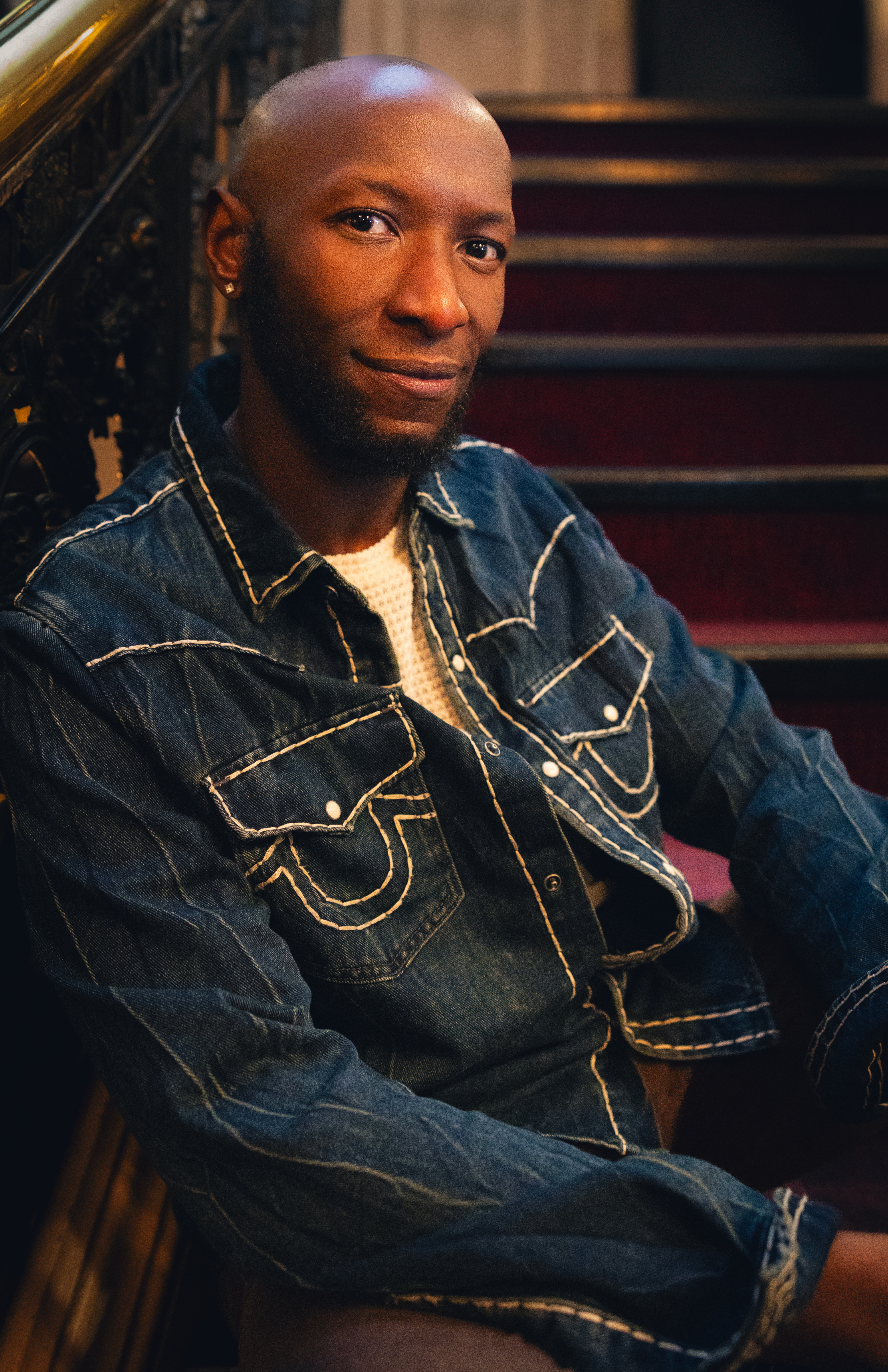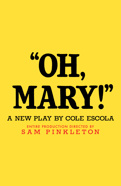Phillip James Brannon Is Oh, Mary!'s New Abraham Lincoln, and His Family Sees the Resemblance

(Photos by Sergio Villarini for Broadway.com)
The stovepipe hat looks familiar, but otherwise, the character of Abraham Lincoln in Oh, Mary! doesn’t have a lot in common with our 16th president. Billed as “Mary’s Husband” in Cole Escola’s smash-hit comedy, the role is currently being played by Phillip James Brannon, a tall and handsome African-American actor. In this version, Honest Abe has his hands full (and then some) with his willful, drunken wife, Mary Todd, a tour-de-force role that Escola recently handed off to Betty Gilpin. (Of course, in this absurdist satire, Lincoln has a few secrets of his own.)
In real life, Brannon has built an impressive resume in new American plays, many of them ensemble pieces. A decade before Oh, Mary!, he took home an Obie Award for Robert O’Hara’s outrageous comedy Bootycandy, demonstrating a gift for mixing raunchy and serious roles. (Brannon won a second Obie on February 1 as part of the ensemble in Raja Feather Kelly’s time-jumping drama The Fires.) A week into his run at the Lyceum Theatre, he mused about the unexpectedly broad appeal of Oh, Mary! and gave a shoutout to the 2025 Oscar nominee who is one of his biggest inspirations.

Of all the roles in the universe, did you expect to be playing Abraham Lincoln on Broadway?
Never—and it’s going to go down as one of my favorite things I’ve ever done for that exact reason. When would I get to play any president besides Barack Obama? The funny part is, I’ve shown family members pictures of me in the costume, and my grandfather and my aunt said, “You know, you look kind of like Abe Lincoln. Maybe you should check out Ancestry.com.” I thought that was hilarious.
What was your reaction the first time you saw Oh, Mary!?
I saw it right before I auditioned, and I can’t remember laughing that hard. Cole is a wonder, and they had the audience in the palm of their hands from the moment they walked through the doors, including me. I was completely obsessed and on board as soon as they came in. It was high comedy and smart and stayed ahead of the audience, which was my favorite thing about it. The jokes are stacked all the way through, but the ensemble never milked anything; they didn’t need to.

It’s disarming to hear a playwright call their work “stupid” and told “through the lens of an idiot.” Why do you think Oh, Mary! caught on, and not just with a downtown audience?
I think people need to laugh, and they don’t always want something that’s right on the nose. A lot of things that are produced feel like a direct commentary on the news. You could absolutely find parallels here, but you’re not being knocked over the head with it. People can feel how smart this play is, but also how stupid. [laughs] It’s how Cole orchestrates the stupidity—how it’s composed—that makes it genius.
Cole must love the fact that the show works with an actress playing Mary. What’s it like to co-star with Betty Gilpin?
The best. Truly! Betty is a rock star. The play does feel singular when you see Cole do it, but you know, we’re actors—of course there is someone else who can step into it and make it special. I did think, what’s this going to be like with a cis straight woman in the role? But it’s this crazy version of Mary Todd Lincoln, so it just matters if they can do it, and Betty knocks it out of the park. She and I and Chris Renfro [new to the cast at “Mary’s Teacher”] got together at her brownstone to go over our lines before we started rehearsal, sitting on her living room floor with cupcakes and pizza while her toddler was sleeping upstairs, and we had a blast. We knew from that moment we were going to have a good time.
You’ve worked in ensemble plays by Amy Herzog, Ayad Akhtar, Lydia R. Diamond, Annie Baker, Raja Feather Kelly, Nathan Alan Davis and many more. How does it feel to play a leading role on Broadway?
It’s a dream come true. I’ve had leading roles since I was in my 20s at Steppenwolf and other places, but there’s something special when you get to be a lead on Broadway. It’s my first time having a dressing room to myself. And to be one of five people taking a bow every night, with three tiers of human beings screaming and cheering? If you were a kid who wanted to be an actor, that’s the dream.

You won an Obie for the explicit comedy Bootycandy, which is even more daring than Oh, Mary! What’s the key to making satire work on stage? Is it easier or harder than serious drama?
I think they require the same thing, which is full commitment. With satire, it’s full commitment to being a fool, and taking it absolutely seriously. You understand that it’s funny, but you also understand the precision with which it needs to be executed. Robert O’Hara, who wrote and directed Bootycandy, said he cast it with his favorite fools. That play was also one of the biggest privileges of my life. I did it in D.C., in Philly and in New York [at Playwrights Horizons]. Having lived here now for 13 or 14 years, I can see Robert’s influence in young writers and plays that have come after it. I think that if Bootycandy was done today, it would move to Broadway like Oh, Mary! or A Strange Loop.

Are there any actors whose careers you particularly admire?
One of my most recent inspirations is Colman Domingo. That might seem like an obvious answer. Growing up, I was obsessed with Don Cheadle—I saw a lot of myself in him—Samuel L. Jackson, Laurence Fishburne, Sidney Poitier, all those people, but I met Colman a year before I moved to New York, about 2011. I was invited to do a workshop of his play Wild With Happy that Robert O’Hara was directing. Colman was playing the part, but he needed to see it so he could continue to work on it. They were very clear that I wasn’t going to be in the production, and yet it became one of my favorite experiences. Colman was so generous and wonderful, and now to see him catapult to stardom has been amazing. I’m watching this out gay Black actor getting to play great roles that have nothing to do with his personal life or his sexual orientation. He’s just getting to be an actor! That’s what you want: amazing projects that inspire you, not put you in a box that someone thinks you belong in.
You’ve built a successful life in the theater. What’s the key to that in 2025?
Hard work and faith. I don’t know if I have a better answer. I can’t quite quit. I’ve been doing this for a long time, and there have absolutely been moments when I’ve questioned or doubted, but I literally can’t not do it. Theater has always been my first love. I’m an only child, so I’ve been playing make-believe since I was a kid, and I know how much of myself I give to it. Theater costs—it takes stamina and love and commitment, so you want to make sure you’re fully behind anything you’re doing. You work hard on every single audition, like you’re going to get the job. Most of them, you don’t, but when you do, you feel lucky and blessed.

Related Shows
Star Files
Articles Trending Now
- Death Becomes Her, Maybe Happy Ending, Oh, Mary! and More Earn Nominations for the 2025 Broadway.com Audience Choice Awards
- Maybe Happy Ending Will Be Hitting the Road on a National Tour, Launching Fall 2026
- Ali Louis Bourzgui Reflects on Joining Hadestown, His Upcoming Album and Processing the Experience of Tommy

